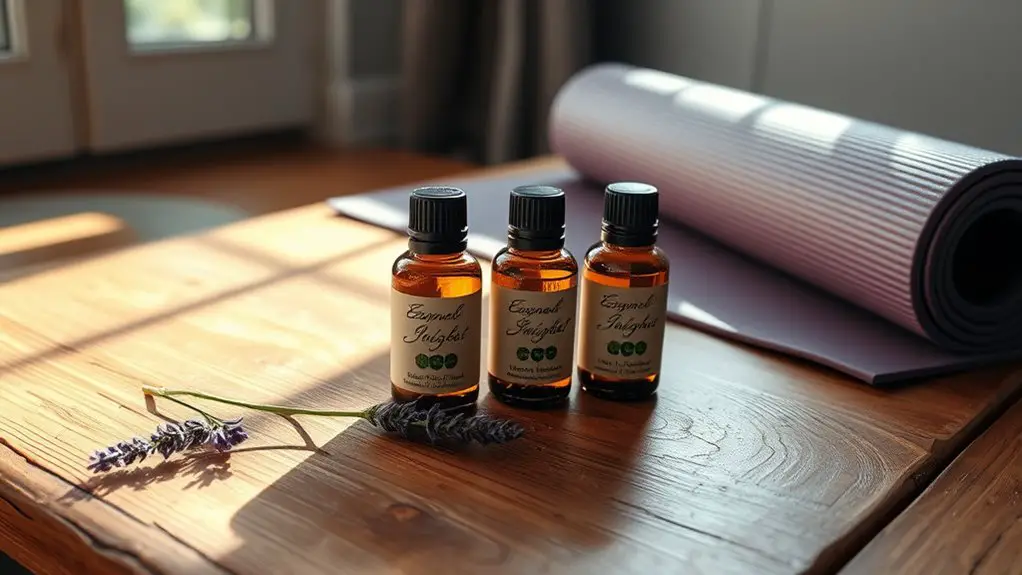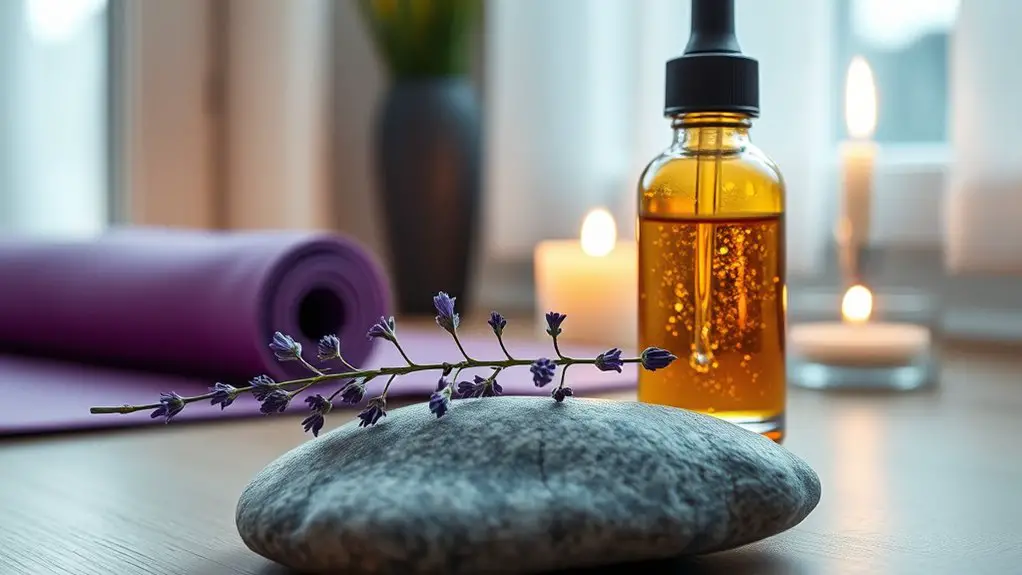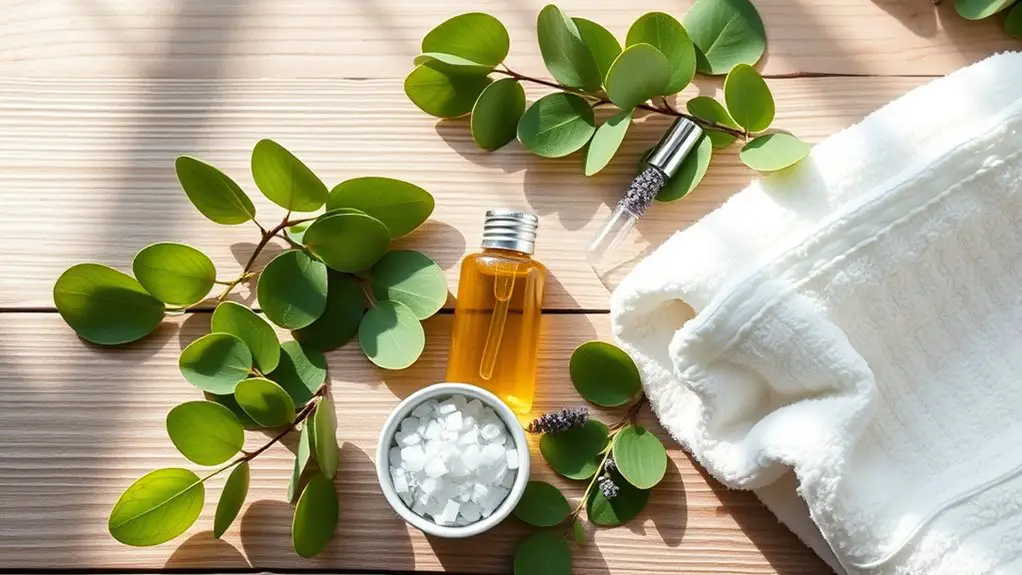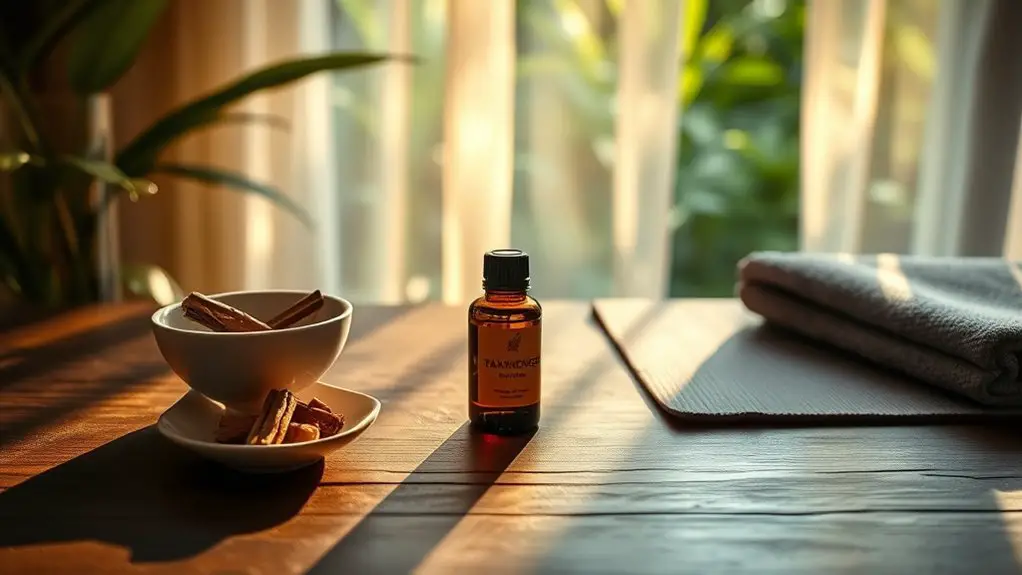The Best Essential Oils for Post-Gym Muscle Relaxation

For post-gym muscle relaxation, essential oils like lavender and peppermint work wonders. Lavender eases tension and anxiety, while peppermint’s cooling sensation boosts circulation and alleviates soreness. Eucalyptus helps reduce inflammation, and rosemary enhances recovery by improving blood flow. Frankincense not only calms but also promotes a sense of peace. Combining these oils with a carrier oil for massages or adding them to your bath can amplify their benefits. There’s plenty more to discover about their uses!
Lavender Essential Oil

When you’re seeking a natural way to ease muscle tension, lavender essential oil might just be what you need. Known for its calming properties, lavender offers numerous benefits for muscle relaxation. One of the key lavender benefits is its ability to reduce stress and anxiety, which can contribute to muscle tightness. By promoting relaxation, it helps your muscles release their grip after a tough workout.
For effective lavender application, consider adding a few drops to a carrier oil and massaging it into sore muscles. Alternatively, you can add lavender oil to your bath for a soothing soak, allowing the aroma to envelop you while it works wonders on your body. Diffusing lavender in your space can also create a tranquil atmosphere, further enhancing relaxation. With its versatile uses, lavender essential oil is a fantastic addition to your post-gym routine for muscle recovery and overall well-being.
Peppermint Essential Oil
Peppermint essential oil is a powerful ally in the quest for muscle relaxation and relief. Its invigorating scent and cooling sensation can help soothe sore muscles after an intense workout. One of the key peppermint oil benefits is its ability to increase circulation, which promotes faster recovery. It’s also known for its analgesic properties, making it effective for reducing pain and tension.
To harness these benefits, try a simple peppermint oil recipe: mix a few drops with a carrier oil like coconut or jojoba, and massage it into your sore muscles. You can also add a few drops to your bath for a relaxing soak that’ll leave you feeling rejuvenated. Additionally, inhaling peppermint oil can help clear your mind, making it a great post-gym addition to your routine. Embrace the invigorating properties of peppermint oil, and watch your recovery improve!
Eucalyptus Essential Oil

Eucalyptus essential oil stands out as a natural remedy for muscle relaxation, thanks to its soothing and invigorating properties. When you’ve pushed your limits at the gym, eucalyptus can help ease tension and promote recovery. One of the key eucalyptus benefits is its ability to reduce inflammation, making it an excellent choice for sore muscles.
You can enjoy eucalyptus applications in several ways. Adding a few drops to your bath can create a calming atmosphere while relaxing your muscles. Alternatively, you might consider mixing it with a carrier oil for a soothing massage that targets specific areas of discomfort. Inhaling eucalyptus oil through a diffuser can also provide mental clarity, helping you unwind after a tough workout. With its revitalizing scent and therapeutic effects, eucalyptus essential oil is a fantastic addition to your post-gym routine, supporting both physical and mental relaxation.
Rosemary Essential Oil
Rosemary essential oil is a powerful ally in the quest for muscle relaxation and recovery. Its invigorating scent and natural properties can help ease tension and promote circulation, making it a go-to choice post-gym. You’ll appreciate the various rosemary benefits, especially its ability to alleviate soreness and stiffness after a challenging workout.
Here’s a quick overview of rosemary applications:
| Application | Method | Benefit |
|---|---|---|
| Massage | Diluted in carrier oil | Relaxes tense muscles |
| Aromatherapy | Diffuser or inhalation | Enhances mood and reduces stress |
| Bath Soak | Added to bath water | Soothes achy muscles |
| Steam Inhalation | Hot water infusion | Clears respiratory pathways |
Incorporating rosemary essential oil into your post-workout routine can enhance your recovery process, making those tough workouts much more manageable.
Frankincense Essential Oil

Frankincense essential oil is a treasured gem in the domain of natural remedies, particularly for muscle relaxation and overall well-being. Its calming properties make it a perfect choice after an intense workout. You’ll appreciate how frankincense benefits not only your muscles but also your mind, helping to reduce stress and promote a sense of peace.
To reap the rewards, consider adding a few drops to your post-gym bath or mixing it with a carrier oil for a soothing massage. The oil penetrates deeply, easing tension and soreness effectively. Frankincense uses extend beyond relaxation; it’s also known for enhancing mood and supporting respiratory health, making it a versatile addition to your wellness routine.
Incorporating frankincense essential oil into your recovery process can elevate your post-workout experience, leaving you refreshed and rejuvenated for your next challenge. So, why not give it a try?
Frequently Asked Questions
Can Essential Oils Be Used in a Diffuser After Workouts?
Yes, you can definitely use essential oils in a diffuser after workouts. The diffuser benefits include creating a calming post-workout ambiance that helps you unwind. Scents like lavender or eucalyptus can enhance relaxation, making your recovery more enjoyable. By filling the room with aromatic oils, you not only soothe your muscles but also elevate your mood. So, set up your diffuser, and let the soothing scents work their magic after your exercise session!
Are There Any Side Effects From Using Essential Oils?
You might think essential oils are all benefits, but there can be side effects. While they’re great for relaxation and mood enhancement, some people experience skin irritation or allergies. It’s important to know your body and patch test new oils before widespread use. Also, certain oils might interact with medications, so consult with a healthcare professional if you’re unsure. Being mindful of these side effects guarantees you get the most out of your essential oil experience.
How Do I Dilute Essential Oils for Topical Use?
To dilute essential oils for topical use, you’ll need to mix them with carrier oils. A common dilution ratio is 2-3 drops of essential oil per teaspoon of carrier oil, like coconut or jojoba. For sensitive skin, you might want to use a lower ratio, around 1 drop per teaspoon. Always do a patch test first to guarantee you don’t have a reaction. Proper dilution helps maximize benefits while minimizing risks!
Can Essential Oils Help With Post-Workout Soreness?
Imagine your muscles soaking up relief like a sponge in water—essential oils can help with post-workout soreness! They’re not just a fragrant indulgence; their aromatherapy benefits can enhance muscle recovery, easing tension and inflammation. Oils like lavender and peppermint work wonders when diluted and massaged into sore spots. By incorporating these natural remedies into your routine, you can turn that post-gym ache into a distant memory, rejuvenating your body for the next workout.
What Is the Best Way to Store Essential Oils?
When it comes to essential oil storage, you’ll want to use a proper container to maintain their potency. Dark glass bottles are ideal, as they protect oils from light, which can degrade their quality. Keep them in a cool, dry place, away from heat sources. Make certain the caps are tightly sealed to prevent evaporation and contamination. By following these steps, you’ll guarantee your essential oils remain effective and last longer.





